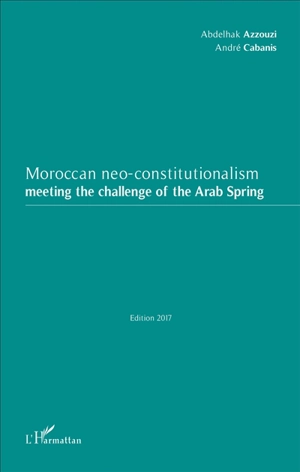
Moroccan neo-constitutionalism meeting the challenge of the Arab spring
Abdelhak Azzouzi , André Cabanis
Versailles, Lyon 2ᵉ, Lyon 6ᵉ...
Ce que dit l'éditeurAny claim at examining the issue of « Moroccan neo-constitutionalism : meeting the challenge of the Arab Spring » is both a necessary and paradoxical task. It is necessary to the extent that we cannot ignore the time that has been chosen for the promulgation of the new July 2011 Constitution, with the aim of meeting the expectations of the different components of the population, particularly the youth. Institutional reforms are not enough to solve all problems, although they provide a strong signal of the ability of the leaders to take into account the bitterness and hopes which, in the rest of the Arab world, have taken a violent form that has generated alternate phases of rioting and repression with their ensuing succession of deaths, sometimes blind persecutions, and economic crisis. Morocco, at least, has managed to avoid such a situation. The examination is a paradoxical one since the constitutional text is set in a continuity that very few countries can match, including a regular development of recognized and protected human rights and civil liberties, in a transition time of a little less than 50 years. This has been coupled by an extension of the role of the head of the government and assemblies, with the appearance and acceptation of a real constitutional control and recognition of the values of decentralization and independent institutional flourishing. |
RésuméEn juillet 2011, une nouvelle constitution a été promulguée au Maroc afin de répondre aux attentes de la population. Les dirigeants montrent ainsi qu'ils tiennent compte des amertumes et des espoirs qui ont mené aux révolutions de 2011 dans le reste du monde arabe. ©Electre 2024 |
Caractéristiques Auteur(s) Éditeur(s) Date de parution
23 mars 2017
Rayon
Droit
EAN
9782343118130
Nombre de pages
245
pages
Reliure
Broché
Dimensions
24.0
cm x
16.0
cm x
1.4
cm
Poids
397
g
|





















